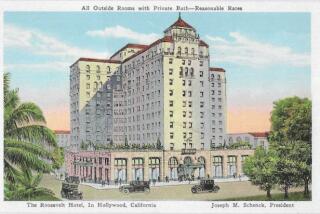NONFICTION - July 3, 1994
- Share via
HOLLYWOOD’S FIRST CHOICES: Or Why Groucho Marx Never Played Rhett Butler by Jeff Burkhart & Bruce Stuart (Crown Publishers: $14, paperback; 230 pp.) Movie buffs and even casual films fans should get a kick out of this breezy, fast-paced account of how some of the greatest movie casting decisions were made. Burkhart and Stuart offer such casting insights as the fact that Claudette Colbert was the original choice to play Margo Channing in the 1950 Academy Award-winning classic, “All About Eve.” But when she was sidelined with a bad back, Bette Davis, whose career was in the doldrums, stepped in; she received an Oscar nomination for her legendary performance. And according to the book, Montgomery Clift (pictured here), not William Holden, was all set to play Joe in Billy Wilder’s “Sunset Boulevard.” Clift pulled out just weeks before production began due to a suicide threat from the woman with whom he was keeping company: Torch singer Libby Holman, nearly 30 years older than Clift, thought the script hit too close to their relationship. The book also details the trials and tribulations behind such acclaimed movies as “Born Yesterday,” “Queen Christina,” “Lawrence of Arabia,” “Apocalypse Now,” “Who’s Afraid of Virginia Woolf?” “Casablanca,” “Gone With the Wind” and “The Godfather.” Unfortunately, the book is marred by inconsistencies and inexcusable factual errors. Throughout the chapter on “Sunset Boulevard,” Holden’s character--Joe Gillis--is referred to as Joe Guiness. Laurence Olivier’s age when he died is stated as 88; he was 82. The release year for “Dinner at Eight” is given as both 1932 and 1933 (the latter is correct). Montgomery Clift is reported to have lost the best actor Oscar for “The Search” to Ronald Colman, who won for 1947’s “A Double Life.” Actually, Clift was nominated for best actor of 1948 and lost to Laurence Olivier in “Hamlet.”
More to Read
Sign up for our Book Club newsletter
Get the latest news, events and more from the Los Angeles Times Book Club, and help us get L.A. reading and talking.
You may occasionally receive promotional content from the Los Angeles Times.








